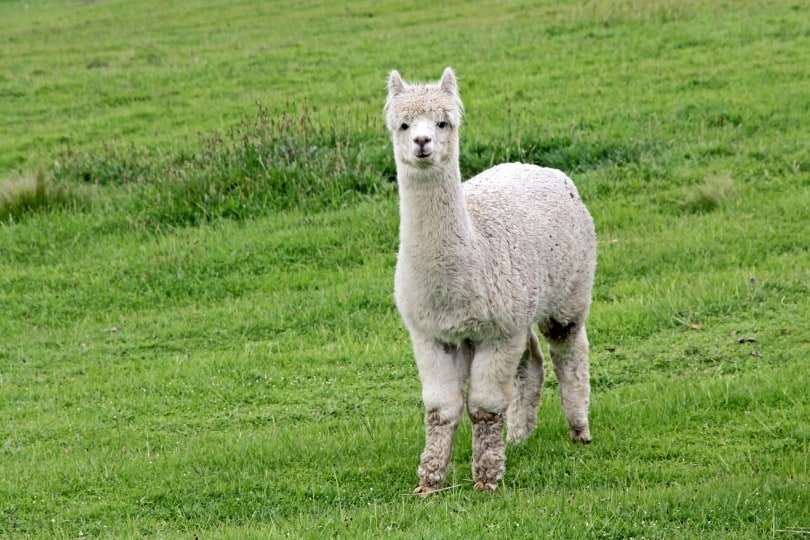Spitting is an act that is rarely acceptable in human behavior but is all too common among animals. Not all alpacas spit, but all can. Their spit contains more air than saliva, although alpacas can also regurgitate some of their stomach contents before spitting it out at their targets, resulting in a pretty disgusting mixture. Alpacas generally reserve their spitting for other alpacas, but an irritated alpaca can also spit on humans.

Why Do Alpacas Spit?
Alpacas communicate through body language. For example, they may spit when they feel in danger, fearful or when they want to show their dominance. Also, male alpacas fighting over a female will want to establish dominance, and spitting is an excellent way to show your opponent who’s leading!
But spitting isn’t just for males: a female who isn’t interested in a male can spit on him to clearly show her disinterest or because she’s already impregnated.
Plus, an alpaca doesn’t need to be nose-to-nose with its rival to show it the power of its spit: it can spit up to 10 feet if necessary! And in this case, the alpaca regurgitates the contents of its stomach in its mouth (much like a cow ruminating), which generates a rather disgusting texture.
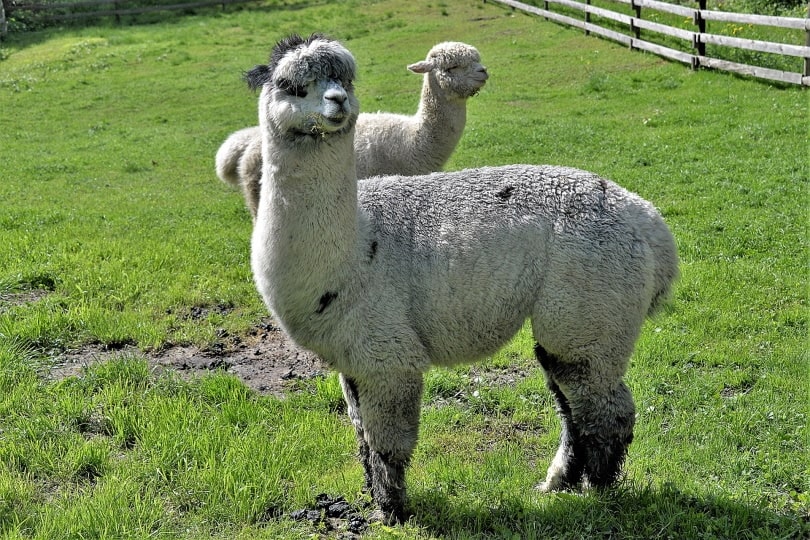
How to Tell if an Alpaca Is About to Spit?
By carefully observing the following signs, it is possible to know that an alpaca is about to spit:
- Humming
- Drooling
- Snorting
- Faster breathing
- Stomping
- Staring
Besides, an alpaca often gives a warning before spitting by blowing air through its nostrils, as horses do. Then, it raises its head, and its ears take on a “pinned” appearance.
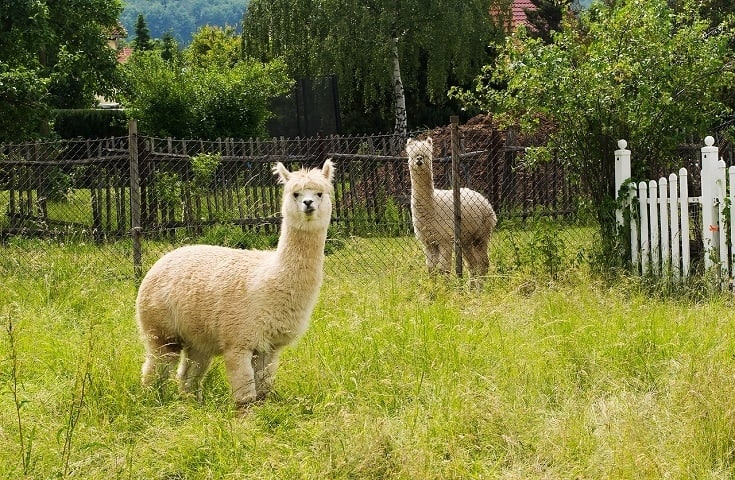
Do Alpacas Spit at Humans?
Alpacas may spit on each other to establish their social order, but they rarely spit on humans. In fact, spitting is often used as a last resort defense mechanism: if an alpaca spits on a human, it means that the latter has not been able to read the warning signs.
Indeed, alpacas communicate through the posture of their bodies, the movement of their tails and ears, and by emitting a variety of sounds. So, like other animals, alpacas use these behaviors to let a human know they are uncomfortable. If the person is not careful or does not understand the warning signs, the alpaca may spit. But this remains rare and occurs especially in cases where the alpaca was raised alone.
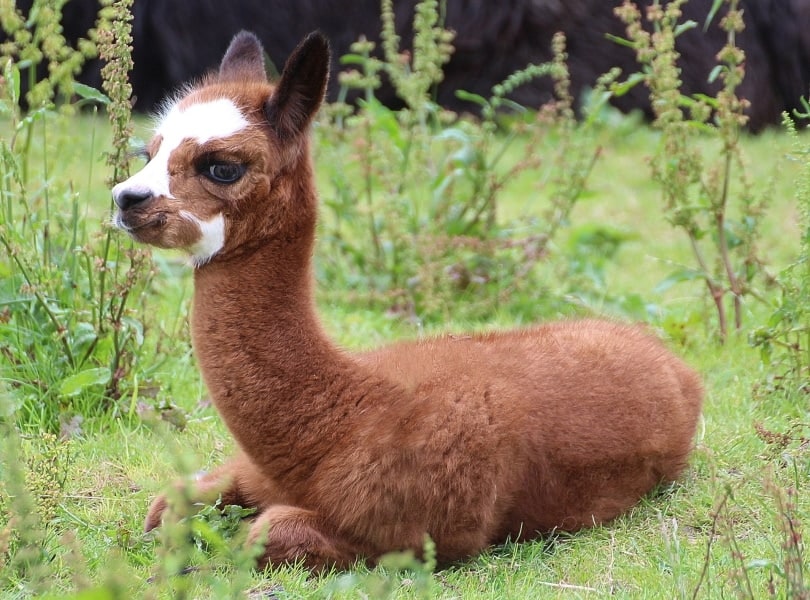
Are Alpacas Docile?
The alpaca is a rather docile animal, but it retains certain independence without being shy. As it has been domesticated for millennia, it is easily tamed by humans. It is also a very curious and intelligent mammal. When it feels confident, it eats from its owner’s hand. However, these animals should be handled as gently as possible and avoid shouting, as they are particularly sensitive.
In fact, alpacas don’t really like to be touched. On the other hand, by good taming techniques, it is possible to minimize the stress caused to the alpaca by human handling. They are sensitive to the sound of humans’ voices and body postures. But giving the alpaca time to regain its calm and relax the muscles of its legs is a good approach. Once calmed down, the alpaca will let itself be touched without any problem.
Moreover, spending time with alpacas can be a very relaxing experience! This is why many people enjoy visiting animal farms and interacting with these beautiful animals that look like big stuffed teddy bears.
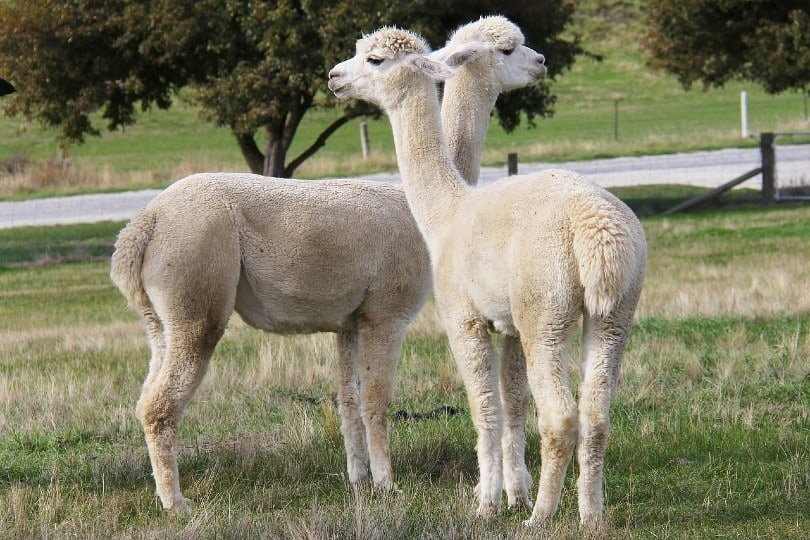
Do Alpacas Bite?
No, alpacas don’t usually bite. Spitting is arguably their only defense mechanism, which leaves them somewhat at the mercy of predators like coyotes and foxes. Interestingly, alpacas do not have teeth on their upper jaw but rather a kind of dental pad, like cattle. They only have teeth on their lower jaw.
What Sounds Do Alpacas Make?
Alpacas make several different sounds: humming, snorting, clucking, screaming, and orgling.
The most common sound is a humming, which they make when bored, tired, or curious. Also, a mother alpaca will hum at her baby (called a cria). They also emit an alarm call when they feel threatened or frightened: it sounds a bit like a squeaky pulley! Finally, only males emit an orgle, which is a mating call.

Final Thoughts
Alpacas spit when they are in distress or feel threatened. They can spit on each other when fighting over food or establishing dominance. In short, alpacas have rules between them, and anyone who breaks them is at risk of getting spit on them. It’s just a way of showing their disagreement. Nevertheless, it is rare for alpacas to spit on people or bite unless they are under significant stress or mistreated.
See also:
- How Much Space Does an Alpaca Need? What You Need To Know!
- What Is a Guard Llama? Can Llamas Protect Sheep?
- Are Cows Herbivores, Omnivores, or Carnivores?What You Need to Know!
Featured Image Credit: Thomas Devenish, Shutterstock
